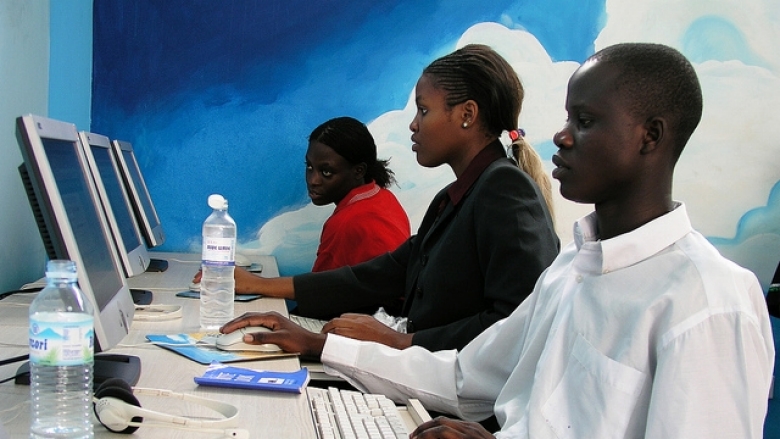It is an ambitious project for a country with Internet penetration of less than ten percent, but the idea is build data gathering and online government services into the very fabric of Burkina Faso.
After a period of social unrest, the country’s new president Roch Marc Christian Kaboré is eager to address concerns about trust in public life, disillusionment about the government’s ability to deliver services and its overall accountability. With support from the government and the World Bank, the eBurkina project aims to:
- Digitally connect public agencies, schools and health facilities
- Register all children and create a unique digital ID for each citizen
- Improve education, health and agriculture by developing eEducation and eHealth and eAgriculture services
- Promote a vibrant ICT industry, through investments in incubation centers, innovation and research and developmen
The eBurkina project’s goals are to make information and communication technologies (ICT) more accessible, cheaper, and better. A new fiber optic network between the border of Ghana and Burkina Faso’s capital Ouagadougou will lay in hard wiring for better connectivity. People and businesses in the country’s better-connected cities will benefit from the project in the beginning, as will those who connect to the government agencies that are producing open data and online information. Even the World Bank office in Ouagadougou will see an improvement over the currently slow and unreliable connectivity to the Internet.
“Yes, it is ambitious,” says Pierre Chrzanowski, who is working on the project for the World Bank. “But we are already seeing big changes in Africa with mobile phones. Just because you only have ten, or even two, percent of users in a country, that doesn’t mean you can’t do something with the Internet. The use of ICT to collect data is crucial, the problems with connectivity will be resolved. So the issue is to make sure, once you have connectivity, that you can deliver better services. We think it is timely to work on eGovernment in a place like Burkina Faso and get in on the beginning.”
Getting in at the beginning means offering quality online services that people can rely on. Immediate goals are to:
- Promote better governance through the use of reliable data
- Reduce the time and expense for people and businesses in accessing public services
- Empower civil society and businesses by providing transparency, accountability and collaboration
Better and more widely used online services could spur job growth and innovation in Burkina Faso’s ICT community, but could also have an impact on agriculture, health and education. For example, better access to information means farmers can improve their yields and figure out the best time to sell their harvest.
Better access to data helps track the spread of disease and gives doctors access to crucial health information. Access to more accurate data on schools can help improve the education system. "Considering that more than 65% of the Burkinabe population is below 25 years old, eBurkina will focus on fostering local skills,” explains Axel Rifon Perez, an ICT policy expert at the World Bank. “Educational institutions provided with connectivity will help young students deepening their knowledge and research, accessing content and therefore increase their opportunities.” Ultimately, the eBurkina project could speed innovation and growth to increase revenues, improve economic resilience and boost employment across the economy, including in agriculture, which occupies around two thirds of the labor force.
But there are challenges.
Burkina Faso continues to be ranked among the poorest countries in the world. And eBurkina has to fit the country’s culture and development. More than 90 percent of the population does not use the Internet. So a combination of fixed and mobile Internet, SMS and voice services would be a multi-faceted approach to ICT service delivery. Citizen access centers, tele centers, off-hour school labs and Internet cafes are ways that the government ultimately could reach people in remote and underserved areas. And a key aspect of this project is that a well-designed multi-channel approach for eBurkina would reach much many more people than the 10% of Internet users with online services.
Burkina Faso is positioning itself as a country of new ideas and ICT plays a key role. Burkina was the first country in the region to launch an open data initiative. The open data initiative’s successes so far include the creation of an agency to promote ICT, an open data web portal, and the release of more than 140 datasets from 28 public sector organizations.
That said, key data like maps and company registers have not been made available. Burkina Faso falls behind in terms of use and access to online eGovernment services, ranking 178 out of 193 countries in the last E-Government Development Index, so there is work still to be done. “We have seen a lot of commitment from the government to leverage technology for development,” says Samia Melhem, the World Bank’s global lead on digital development. “Other countries are doing it, just take a look at Rwanda and Kenya, for example. The World Bank is helping the government use technology to accelerate its path toward development-- by connecting rural communities to vital information, like commodity prices for farmers, registration services for businesses, and other government services for all citizens.”

